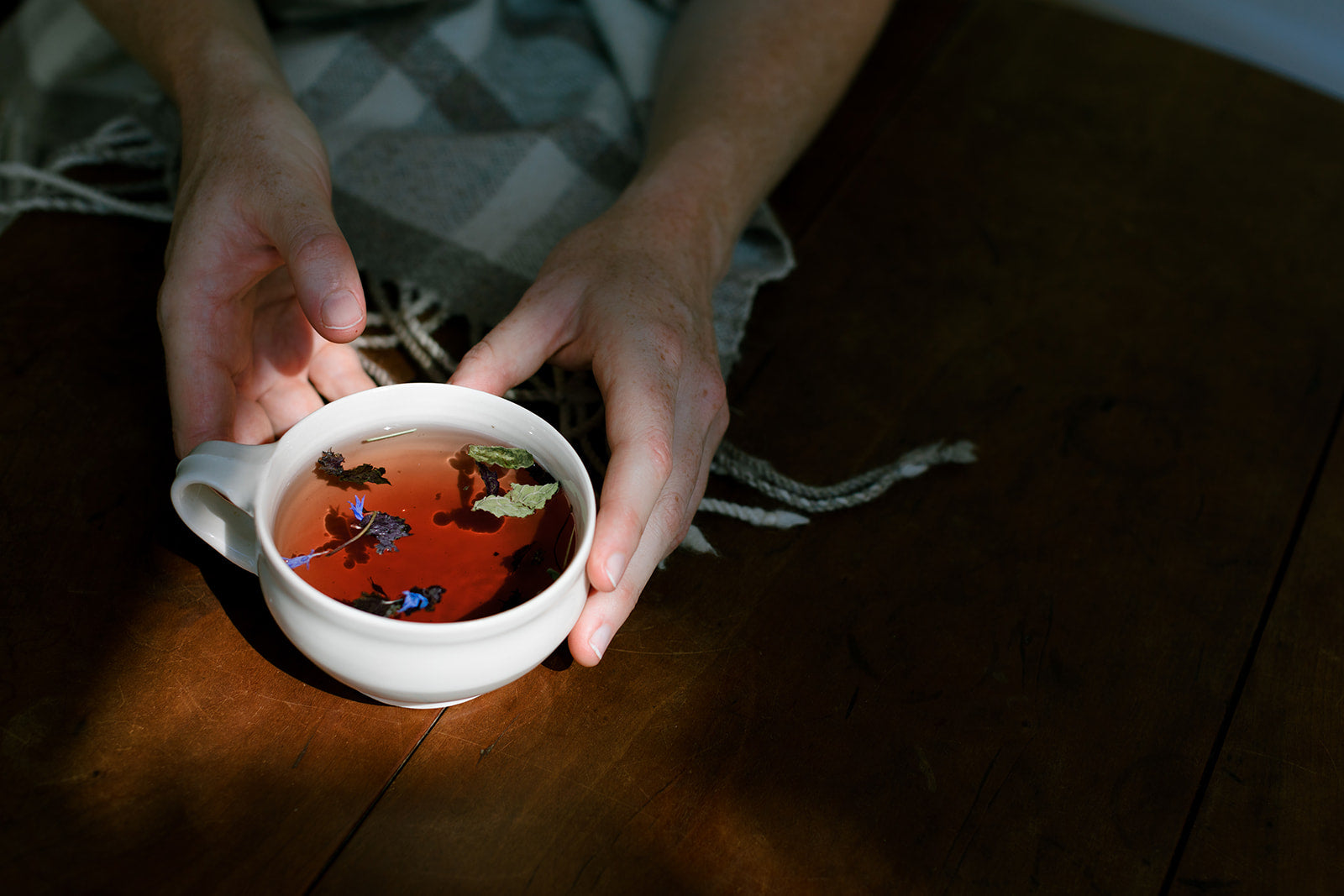Hydrate and Heal Skin from Within: Herbs for Skin Care
No matter what your skin type, area of concern, or goals for your skin may be, topical products are only going to get you so far. Yes, a few gentle yet potent, good natural skin care products can help protect and repair the skin’s barrier, manage minor fluctuations, keep the skin hydrated, and offer some benefits from the surface! Yet, major shifts in the health of our skin come from within. The skin is the largest organ in the body and it both protects the rest of our body from the outside world, and expresses what’s going on inside. In herbalism, we try to alleviate symptoms but also know that the biggest changes come from addressing the root of the issue. There are many factors that may affect skin health but we are going to cover a few important places to start.

Gut Health and Microbiome
The skin and the digestive tract are intricately linked and the microbiome plays an important role in a wide variety of skin disorders. Looking at the link between the two systems, we know that nurturing the gut can significantly impact skin health. Here are three ways we can help support gut health:
Probiotics
According to some studies, probiotics can support the gut microbiome and intestinal health and may prevent intestinal inflammation. There are many general and more tailored probiotic supplements - the best probiotic supplement may depend on an individual's specific symptoms and needs. Another great way to balance the intestinal flora is to consume probiotics in food. Probiotic foods include kimchi and sauerkraut, kefir, yogurt, kombucha, miso and unpasteurized vinegars (we love Tart Vinegar!).
Digestive Bitters

Bitters are botanical preparations made out of plants that stimulate the body's digestive secretions via the bitter flavor. Using digestive bitters for digestion works because the bitters herbs stimulate digestive secretions like saliva, bile, enzymes and hydrochloric acid. Bitters can help the body better absorb nutrients, support appetite regulation and liver function and - because of the gut-brain connection - can help the body cope with stress.
Try our Digestive Bitters, and read more about digestive bitters benefits, history and use on our Journal.
Demulcents
Plants that contain a slippery, slimy substance called mucilage are called demulcent, or mucilaginous herbs. Demulcent herbs have been traditionally used in herbalism to soothe mucous membranes, including the gut. Mucilaginous herbs coat the digestive tract and are rich in prebiotics, which support a healthy gut microbiome. Mucilage benefits the skin from inside but also topically, because it holds water and helps the body and the skin stay hydrated. Examples of mucilaginous plants are marshmallow, slippery elm, hibiscus, chia seeds and plantain leaf (Plantago spp.).
Antioxidants
Antioxidants are naturally occurring compounds that protect the body from cellular damage. Essentially, antioxidants slow premature aging by deactivating excess free radicals and keeping them from damaging cells. Antioxidants support the whole body but we often think about them in relationship to our skin because we visually notice signs of aging in our appearance. We can use antioxidants like Vitamin C and reservatrol for skin because they help stimulate collagen production and support elasticity of skin, affecting smooth, youthful looking, and plump skin.

Minerals
Like the rest of the body, we require a diet rich in minerals for skin health. Proper nutrition helps maintain and repair skin barrier function and the very structure of the skin. In addition to a varied diet based on whole, unprocessed foods, mineral rich herbs like stinging nettle, alfalfa, and raspberry leaf. Horsetail is often used for skin health because it contains up to 25% silica by weight, a mineral that is essential for collagen synthesis for strong elastic skin and preventing brittle hair and nails.
A great way to consume many of these mineral rich herbs is in the form of an herbal infusion, which is a tea steeped for many hours, like our Village Tea Mineral Infusion.
-------------------------------------------------------------------------------------------
References
De Pessemier B, Grine L, Debaere M, Maes A, Paetzold B, Callewaert C. Gut-Skin Axis: Current Knowledge of the Interrelationship between Microbial Dysbiosis and Skin Conditions. Microorganisms. 2021 Feb 11;9(2):353. doi: 10.3390/microorganisms9020353. PMID: 33670115; PMCID: PMC7916842.
Dybka-Stępień K, Otlewska A, Góźdź P, Piotrowska M. The Renaissance of Plant Mucilage in Health Promotion and Industrial Applications: A Review. Nutrients. 2021 Sep 24;13(10):3354. doi: 10.3390/nu13103354. PMID: 34684354; PMCID: PMC8539170.
Hemarajata P, Versalovic J. Effects of probiotics on gut microbiota: mechanisms of intestinal immunomodulation and neuromodulation. Therap Adv Gastroenterol. 2013 Jan;6(1):39-51. doi: 10.1177/1756283X12459294. PMID: 23320049; PMCID: PMC3539293.
Carabotti M, Scirocco A, Maselli MA, Severi C. The gut-brain axis: interactions between enteric microbiota, central and enteric nervous systems. Ann Gastroenterol. 2015 Apr-Jun;28(2):203-209. PMID: 25830558; PMCID: PMC4367209.
https://www.verywellhealth.com/antioxidants-for-skin-health-4587778
Leis K, Pisanko K, Jundziłł A, Mazur E, Mêcińska-Jundziłł K, Witmanowski H. Resveratrol as a factor preventing skin aging and affecting its regeneration. Postepy Dermatol Alergol. 2022 Jun;39(3):439-445. doi: 10.5114/ada.2022.117547. Epub 2022 Jul 15. PMID: 35950117; PMCID: PMC9326919.
Petruk G, Del Giudice R, Rigano MM, Monti DM. Antioxidants from Plants Protect against Skin Photoaging. Oxid Med Cell Longev. 2018 Aug 2;2018:1454936. doi: 10.1155/2018/1454936. PMID: 30174780; PMCID: PMC6098906.
Michalak M. Plant-Derived Antioxidants: Significance in Skin Health and the Ageing Process. Int J Mol Sci. 2022 Jan 6;23(2):585. doi: 10.3390/ijms23020585. PMID: 35054770; PMCID: PMC8776015.
Park K. Role of micronutrients in skin health and function. Biomol Ther (Seoul). 2015 May;23(3):207-17. doi: 10.4062/biomolther.2015.003. Epub 2015 May 1. PMID: 25995818; PMCID: PMC4428712.
Haftek M, Abdayem R, Guyonnet-Debersac P. Skin Minerals: Key Roles of Inorganic Elements in Skin Physiological Functions. Int J Mol Sci. 2022 Jun 3;23(11):6267. doi: 10.3390/ijms23116267. PMID: 35682946; PMCID: PMC9181837.
Bhusal KK, Magar SK, Thapa R, Lamsal A, Bhandari S, Maharjan R, Shrestha S, Shrestha J. Nutritional and pharmacological importance of stinging nettle (Urtica dioica L.): A review. Heliyon. 2022 Jun 22;8(6):e09717. doi: 10.1016/j.heliyon.2022.e09717. PMID: 35800714; PMCID: PMC9253158.
Araújo LA, Addor F, Campos PM. Use of silicon for skin and hair care: an approach of chemical forms available and efficacy. An Bras Dermatol. 2016 May-Jun;91(3):331-5. doi: 10.1590/abd1806-4841.20163986. PMID: 27438201; PMCID: PMC4938278.



1 comment
Rich in information! You can remind me of these points often. I’m going to start making the Village Tea before bed and letting it steep overnight. Thank you, my dearest herbalist!
Leave a comment